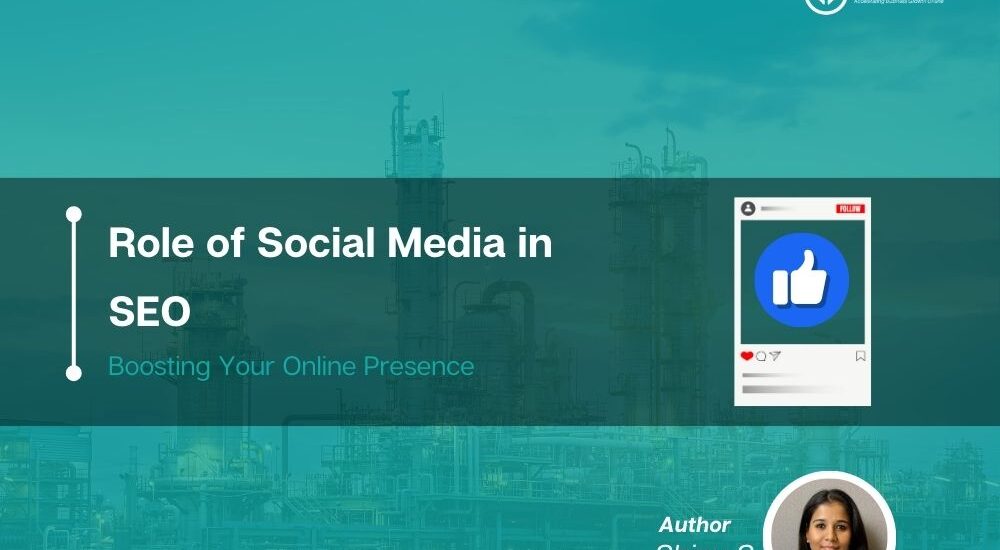Role of Social Media in SEO
Boosting Your Online Presence

Table of Contents
Social media platforms have emerged as powerful tools for engagement, brand building, and audience interaction. Understanding the convergence between SEO and social media is crucial for utilizing it effectively. This article explores the complicated relationship between social media and SEO and how an integrated strategy can boost the online presence.
What is SEO and Its Core Components?
SEO confines a range of strategies to improve a website’s ranking on search engine results pages (SERPs) to increase organic (non-paid) traffic from search engines like Google, Bing, and Yahoo. Components of SEO include:
Keyword Research and Optimization
- Identify and use relevant keywords that potential customers use to search for products, services, or information.
On-Page SEO
- Optimizing individual web pages to rank higher with high-quality content, meta tags, header tags, and images.
Technical SEO
- To Ensure the website technical requirements of search engines like site speed, mobile friendliness, indexing, crawlability, and secure connections (HTTPS).
Off-Page SEO
- Activities outside the website to improve its authority and ranking through backlinks from reputable sites.
Content Creation
- Regularly update high-quality and valuable content to address the needs and interests of the target audience.
What is the Role of Social Media in SEO?
Though social media is not a direct ranking factor for search engines like Google, its impact on SEO is adaptable. Here are ways social media influences SEO:
Content Distribution and Amplification
- Social media serve as powerful channels for distributing content.
- Sharing blog posts, articles, videos, and other types of content on social media can increase its visibility.
- The increased traffic signals search engines that the content is valuable and relevant to impact the rankings positively.
Backlink Opportunities
- Quality backlinks from authoritative websites are a ranking factor for SEO.
- Social media can increase the content’s exposure to influential people or entities to encounter the content on their websites or blogs, thereby generating valuable backlinks.
Improved Brand Awareness and Engagement
- A social media presence can improve brand visibility and awareness.
- When users encounter the brand across platforms, they search for it directly on search engines, boosting your SEO.
Social Signals as Indirect Ranking Factors
- Likes, shares, and comments indicate the content is engaged with users and can be related to factors that influence rankings.
- High engagement rates lead to more traffic and backlinks for SEO.
Enhanced Local SEO
- For Local businesses, social media profiles enhance local SEO efforts.
- Consistent information across social media profiles and Google My Business builds credibility and trust.
- Encouraging reviews and interactions on social platforms can positively influence local search rankings.
Content Freshness and Indexation
- Search engines favor fresh and regularly updated content.
- Social media encourages the creation and sharing of new content.
- New content on social media gets indexed faster by search engines to better SEO performance.
What are the Strategies for using Social Media to Boost SEO?
To integrate social media into the SEO strategy, consider the following:
Create and Share High-Quality Content
- High-quality, engaging content is the foundation of social media and SEO success.
- Focus on informative, valuable, and shareable content.
- Infographics, videos, blog posts, and podcasts perform well on social media and can drive traffic to the site.
Optimize Social Media Profiles
- Ensure the social media profiles are fully optimized.
- Use consistent branding and relevant keywords in the bio and descriptions, and provide complete contact information.
- Optimized profiles rank in search results and drive more traffic to the website.
Engage with the Audience
- Active engagement enables a loyal community on social media by responding to comments, participating in conversations, and managing customer queries.
- High levels of engagement can lead to shares and interactions benefiting SEO.
Utilize Social Media for link-building:
- Social media can be valuable for link building.
- Share content that naturally attracts backlinks and reaches out to influencers and bloggers in the industry.
- Collaborations and partnerships through social media can result in valuable backlinks to the site.
Encourage Social Sharing
- Make it easy for the audience to share the content by including social sharing buttons on the website and blog to increase the reach of the content and drive more traffic.
Monitor Social Media Analytics
- Regularly analyze the social media performance using Google Analytics, Facebook Insights, and Twitter Analytics.
- Understand which content performs best and adjust the strategy.
- Insights from social media analytics can refine the marketing approach.
Leverage User-Generated Content
- Encourage the audience to create content related to the brand.
- User-generated content, reviews, testimonials, and social media posts enhance credibility and attract more traffic.
- Sharing this content on your social media platforms also fosters community and engagement.
Integrate Social Media with the SEO Tools
- Moz and Ahrefs offer social media integration features.
- Use tools to track social signals, monitor brand mentions, and identify content opportunities to enhance social media and SEO efforts.
The Future Trends: Social Media and SEO
The digital landscape is ever-evolving, and the relationship between social media and SEO continues to develop. Here are some future trends to watch:
Voice Search Optimization
- Alexa and Google Assistant optimizing content for voice search is becoming essential.
- Social media content, Q&A sessions, podcasts, and videos can capture voice search queries.
Visual and Video Content Dominance
- Platforms like Instagram, YouTube, and TikTok can enhance SEO.
- Investing in high-quality visual content like images and videos and optimizing it for search can yield noteworthy SEO benefits.
AI and Machine Learning
- Artificial intelligence and machine learning are transforming SEO and social media marketing.
- Algorithms are more refined in understanding user intent and content relevance.
- AI tools for social media analytics and SEO can deliver deeper insights and enhance strategy effectiveness.
Increased Focus on User Experience
- Search engines prefer user experience, and social media has a critical role in shaping it.
- Positive interactions on social media can improve user perception and satisfaction, benefiting SEO.
- Ensuring a seamless, engaging experience on social media and the website is essential.
Integration of Social Commerce
- Social commerce, e-commerce integration, and social media are achieving traction.
- Instagram and Facebook are increasingly including shopping features.
- Optimizing social commerce strategies can drive traffic and conversions to overall SEO performance.
Conclusion:
Social media and SEO are dynamic and influential forces in marketing. While social media is not a direct ranking factor for search engines, its influence on SEO is undeniable. Amplifying content reach, generating backlinks, and enhancing brand visibility can boost the online presence. Integrating social media with the SEO strategy requires a thoughtful approach, focusing on high-quality content, active engagement, and leveraging analytics for continuous improvement.







